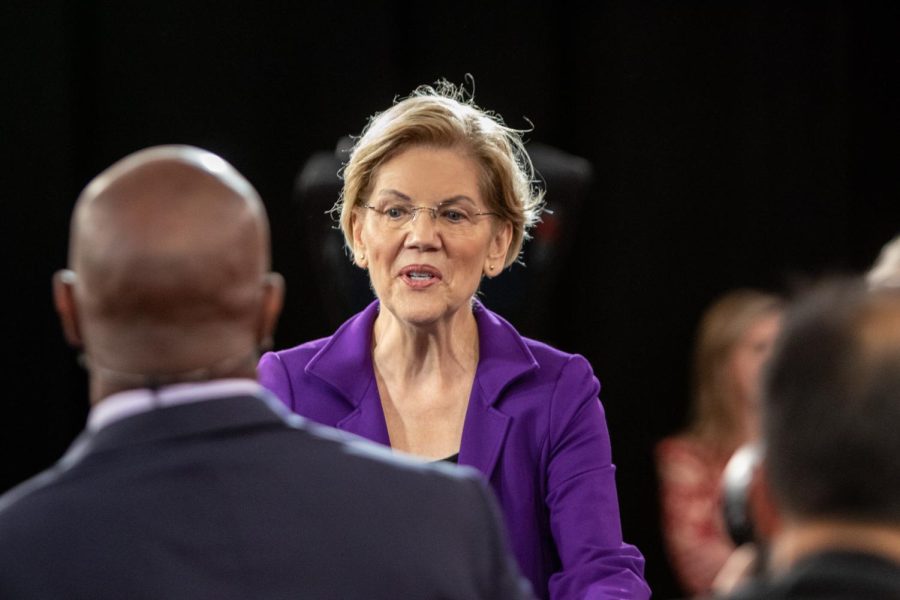Takeaways from the fourth democratic debate
Debate Breakdown from KentWired.com on Vimeo.
Maddy Haberberger, TV2 Reporter
October 16, 2019
Twelve democratic candidates took the stage Tuesday for the largest presidential primary debate in history, discussing issues in Ohio, health concerns of candidates and a potential presidential impeachment.
Hundreds of people packed Otterbein University’s campus to watch the debate hosted by The New York Times and CNN.
Democratic supporters, as well as protesters, lined the streets holding signs and calling attention to issues like gun control, abortion and minimum wage increases.
Brandon Hawkins and Laura Keller, the president and vice president of Kent State’s College Democrats, attended the debate alongside 37 other College Democrat members from separate universities in Ohio.
Hawkins said he looked forward to a healthy, positive debate between the candidates.
“We are looking to see where all the candidates stand now, how things have changed over the course of these debates,” Keller said.
The moderators of the debate were CNN’s Anderson Cooper and Erin Burnett joined by The New York Times national editor Marc Lacey.
Here’s a few main takeaways:
Sen. Elizabeth Warren
Warren, a frontrunner who continues to rise in the polls, faced criticism from fellow candidates throughout the night regarding her stance on healthcare and tax proposals.
South Bend Indiana Mayor Pete Buttigieg challenged Warren on her healthcare plan when she did not answer whether the middle-class taxes would increase.
Sen. Kamala Harris of California questioned Warren when she did not agree with Harris saying President Donald Trump’s social media presence should be eliminated.
During the debate, Warren spoke for the most amount of time at 23 minutes. Her time is over three times the seven minutes billionaire Tom Steyer spoke.
South Bend Indiana Mayor Pete Buttigieg speaks out
Buttigieg also challenged Warren on her healthcare plan when she did not answer whether the middle-class taxes would increase.
“Your signature, Senator, is to have a plan for everything, except this” Buttigieg said.
Warren said she does have the basic principles for her plan laid out, but did not reveal specifically what they are.
Buttigieg also did not refrain from criticizing former Texas representative Beto O’Rourke on gun control issues.
During the third democratic debate, O’Rourke announced his mandatory gun buyback plan, but has not given details on how the plan would work.
Buttigieg said universal background checks would be one way to more efficiently enforce gun regulations, rather than O’Rourke’s buyback plan.
O’Rourke did not give specifics of his plan when Buttiegig questioned him.
Candidate age and health concerns
After suffering a heart attack two weeks ago, Sen. Bernie Sanders faced concerns about whether he is healthy enough to take on the role of president.
Sanders responded and said, “I’m healthy, I’m feeling good.”
He told the audience he is planning “a vigorous campaign all over this country,” a way to reassure the American people that he is healthy and fit for the presidency. Sanders directed the audience to his website for more information.
The ages of Warren and Biden were also highlighted. If elected, Biden would turn 80 years old during his first term and Warren would be 71.
Biden said with his age and experience comes wisdom.
“I’ve done it before … I know what has to be done,” Biden said.
Furthermore, he said he will “release my medical records, as I have 21 years of my tax records, which no one else on this stage has done, so that you can have full transparency as to my health and what I am doing.”
Warren told the audience she will “out-work, out-organize and out-last anyone.”
Impeachment Inquiry
Among disagreements and arguments between the candidates, one topic seemed to receive an unanimous agreement: the impeachment of President Donald Trump.
“In my judgement, Trump is the most corrupt president in the history of this country,” Sanders said.
Sander’s remarks were supported by fellow candidates and the desire to remove Trump from the White House made its way into many of the topics candidates discussed.
“The impeachment must go forward,” Warren said.
Before the debate began, Speaker of the House Nancy Pelosi announced the delay of a full House vote to authorize the impeachment inquiry.
Ohio issues: opioids and GM
Lacey raised questions on key issues that impact Ohio including the current strike at General Motors. Lacey said GM used to be the largest employer in Ohio, but is now the 72nd.
Sen. Cory Booker used this topic to promote his support of a minimum wage increase to $15 an hour.
“I stood with unions, because right now in America unions are under attack,” Booker said.
Another issue in Ohio, and surrounding areas, is the opioid epidemic.
Sen. Amy Klobuchar said the people manufacturing the opioids are the ones who should pay for it.
Harris also agreed with Klobuchar, adding “[Pharmaceutical companies] knew what they were pushing in communities and states like Ohio, without any concern about the repercussions because they were profiting and making big bucks. And, yes, they should be held accountable. This is a matter of justice.”
What’s next
The fifth democratic debate will be Nov. 20 hosted by The Washington Post and MSNBC in Georgia.
Currently eight of the 12 candidates qualify for the November debate. O’Rourke, Rep. Tulsi Gabbard, Sen. Amy Klobuchar and former housing secretary Julian Castro do not currently qualify.
“It’s always a scramble for time with 12 people up there, but I made the best use of my time that I did get … I think that will make a difference,” Castro said.
Contact Lauren Sasala at [email protected].
Contact Maddy Haberberger at [email protected].












